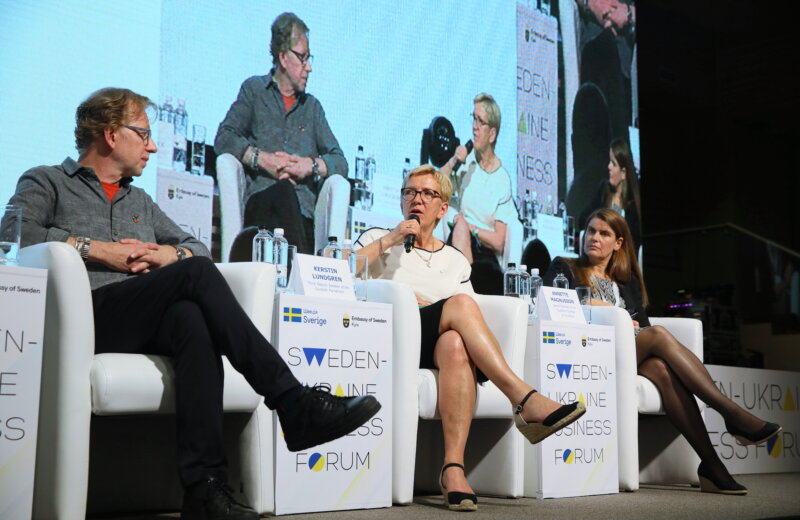The 8th Sweden-Ukraine Business forum, one of the largest business events of the year, was held in Kyiv on May 23.
Swedish and Ukrainian experts, as well as officials and business representatives, discussed vital topics for the Ukrainian economy such as sustainable development, decentralization and digital transformation opportunities for cities.
The forum was organized by the Swedish Embassy in Kyiv with the support of its major partners, such as ABB, Electrolux, Ericsson, Grain Alliance, Scania, Sigma Software and SKF.
During the day, achievements in various spheres were summarized by the speakers at the Parkovy Business Center which overlooks Kyiv’s Dnipro River, this year’s location for the forum.
“I’ve been working in Ukraine for three years now, and I’ve seen for these years very dynamic developments, in trade particular. We’ve also seen during these years a number of high profile new entrances, like H&M. IKEA is still waiting for the opening new store (in Kyiv) and we know that it will happen this year,” said Martin Hagstrom, Swedish ambassador to Ukraine.
But at the same time, Sweden’s trade with Ukraine is still lower than with smaller countries, for example in its neighboring Baltic region, according to Hagstrom. In 2018, bilateral trade between the two countries reached a modest $694.3 million, or 0.6 percent of all of Ukraine’s international trade, according to Ukraine’s State Statistics Service.
Sometimes the difference in trade amounts in dozens of times, Hagstrom said, even though Sweden is only about two hours away from Ukraine by plane.
Unlike Ukraine, in Sweden there is a huge demand from civil society and the business community for sustainable solutions on social, economic and environmental issues made by the government, according to Kerstin Lundgren, third deputy speaker of the Swedish parliament.
“If you don’t trust democracy, if you don’t trust in a good governance, if you don’t believe that this will work not only for today but for the decisions that have to be taken for long-term investments for the future, if you don’t believe in a system, you will act as if today is the only way forward,” said Lundgren.
Another way to bring the two countries closer would be to show how Ukrainian companies are beginning to prioritize sustainable goals. Some progress already can be seen here.
“A good Ukrainian example – is the recent non-financial report made by Energoatom (national nuclear energy generating company), which implemented and prioritized sustainable development goals. There are plenty Ukrainian startups which are very inspiring, such as Re-beau, it’s a jewelry made of upcycled plastics,” said Klaudia Sheveliuk, founder of the Change Agency Responsible Future.
Decentralization boosts Ukraine’s image
One of the most successful reforms in recent years in Ukraine – decentralization – is another possible tool to bring more investments from Sweden to Ukraine by showing transparency and efficiency of the projects in Ukrainian cities and by making a comfortable environment for businesses to operate in.
“Decentralization is very important, because all businesses and companies exist and operate in a local context, even though the market might be global. It has a key role in creating right conditions for business climate,” said Carola Gunnarsson, chair of Sala municipality council in northern Sweden.
Since decentralization reform was launched in 2014, opportunities have opened up to regional authorities to bring various projects to local communities in Ukraine.
“This (decentralization reform) made it possible for deficit budgets to (switch to) surplus for the first time since Ukraine gained independence,” said Sergiy Sharshov who is responsible for construction and municipal development at Ukraine’s Ministry of Regional Development.
As a result, for the past three years, in many depressed rural areas across Ukraine, 10,000 projects were made in various directions – from creating centers for administrative services, repairing roads to building educational and healthcare centers, according to Sharshov.
“The city of Zhytomyr was the first to launch a cashless payment system two years ago in urban transportation. We were the third city in Europe after London and one Czech city. At the moment, any form of payment is available in all of Zhytomyr’s municipal transport,” said Sergiy Sukhomlyn, mayor of Zhytomyr.
Meanwhile, in Sweden there are 290 municipalities, where the smallest one has 2,500 inhabitants, while the biggest one is Stockholm with almost one million people, according Gunnarsson.
But responsibilities towards citizens must be the same regardless the size of municipality, she says.
At the same time, a major problem that Ukraine currently faces is the lack of specialists who can efficiently manage these projects, according to Sharshov.



